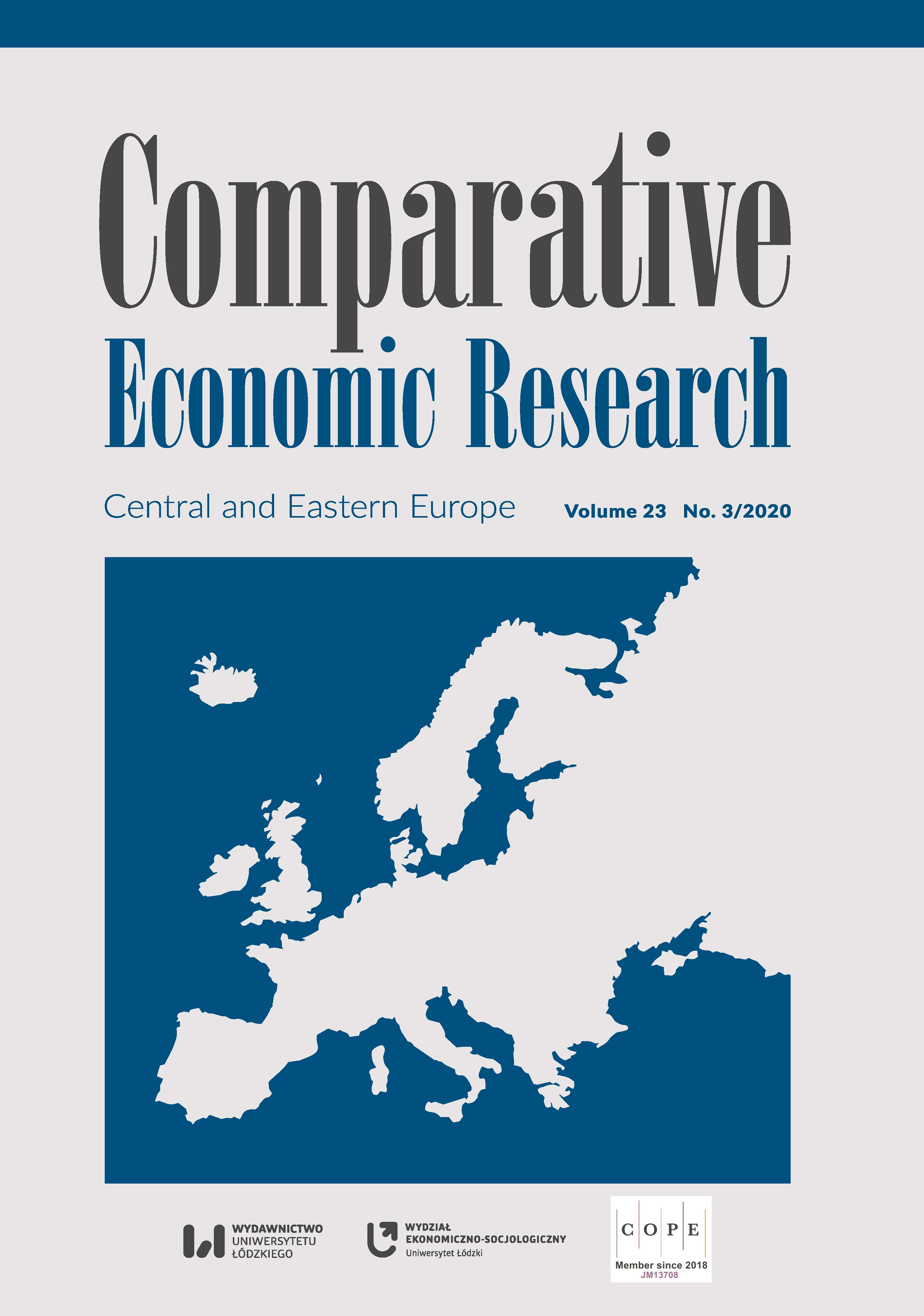Handel elektroniczny jako konsekwencja innowacji i przyczyna nowych innowacji dla MŚP: perspektywy Łotwy i Litwy
DOI:
https://doi.org/10.18778/1508-2008.23.17Słowa kluczowe:
handel elektroniczny, MŚP, innowacje, motywacjaAbstrakt
Pojawienie się nowych technologii i rozwój cyfryzacji stworzyły okazję dla rozwoju handlu elektronicznego. Dostawca i nabywca towarów i usług spotykają się w środowisku elektronicznym i rozwiązują swoje problemy bez bezpośredniego kontaktu, przynosząc wzajemne korzyści. W UE i w krajach badanych przez niniejsze badanie MŚP stanowią większość ogółu przedsiębiorstw. W związku z tym handel elektroniczny (e-handel) jako system, w świetle globalizacji, staje się ważnym priorytetem badawczym, a ocena tego z perspektywy dostawców i nabywców jest szczególnym zadaniem niniejszego badania. W niniejszym badaniu wykorzystano dane Eurostatu, OECD i Centralnego Biura Statystycznego Łotwy, a także dane autorów z ankiety (użytkownicy handlu elektronicznego: dostawcy (n = 112) i nabywcy (n = 138) towarów i usług) przeprowadzenego na Łotwie i Litwie. Analiza danych pozwoliła stwierdzić, że pozytywne i negatywne perspektywy badanego zjawiska zostały podane zarówno przez dostawców, jak i nabywców. Z tego powodu istnieje potrzeba zmotywowania społeczeństwa jako całości i struktur zarządzania na wszystkich szczeblach, aby uzgodnić nowoczesność z tradycyjną, co jest spowodowane ekspansją handlu elektronicznego.
Pobrania
Bibliografia
Berg, J., Furrer, M., Harmon, E., Rani, U., Silberman, M. (2018), Digital labour platforms and the future of work. Towards decent work in the online world. ILO, Geneva. P. 160, https://www.ilo.org/wcmsp5/groups/public/---dgreports/---dcomm/---publ/documents/publication/wcms_645337.pdf (accessed: 15.11.2019).
Google Scholar
Byungjoon, Y., Moonkyoung, J. (2019), A bibliographic survey of business models, service relationships, and technology in electronic commerce, “Electronic Commerce Research and Applications”, 33 (2019), 100818. https://doi.org/10.1016/j.elerap.2018.11.005
Google Scholar
DOI: https://doi.org/10.1016/j.elerap.2018.11.005
Digital Transformation of Business Models – Best Practice, Enablers, and Roadmap. “International Journal of Innovation Management”, 21 (8), (December 2017) 1740014 (17 pages). https://doi.org/10.1142/S136391961740014X
Google Scholar
European Commission (2010), Europe 2020: a European Strategy for Smart, Sustainable and Inclusive Growth. Brussels. http://ec.europa.eu/eu2020/pdf/COMPLETENBARROSO007-Europe2020-EN-version.pdf (accessed: 5.12.2019).
Google Scholar
European Commission (2014), Digital Economy and Society Index (DESI), https://digital-agenda-data.eu/datasets/http-semantic-digital-agenda-data-eu-dataset-lead-indicators/indicators (accessed: 24.11.2019).
Google Scholar
European Commission (2017a), Digital Single Market strategy: – Mid-term review, https://eur-lex.europa.eu/content/news/digital_market.html (accessed: 5.01.2020).
Google Scholar
European Commission (2017b), Digital Economy and Society Index (DESI). Methodological note, http://ec.europa.eu/information_society/newsroom/image/document/2018-20/desi-2018-methodology_E886EDCA-B32A-AEFB-07F5911DE975477B_52297.pdf (accessed: 30.11.2019).
Google Scholar
European Commission (2018a), European Innovation Scoreboard. International Market. Industry. Entrepreneurship and SMEs, https://ec.europa.eu/growth/industry/innovation/facts-figures/scoreboards_en (accessed: 27.12.2019).
Google Scholar
European Commission (2018b), Countries performance in digitisation, https://ec.europa.eu/digital-single-market/en/countries-performance-digitisation (accessed: 14.12.2019).
Google Scholar
European Ecommerce Report (2018), European ecommerce association, https://www.scribd.com/document/383111825/European-Ecommerce-Report-2018 (accessed: 12.01.2020).
Google Scholar
Eurostat regional yearbook (2018), https://ec.europa.eu/eurostat/publications/statistical-books/regional-yearbook (accessed: 17.12.2019).
Google Scholar
Global Forum on Agriculture (2018), Digital technologies in food and agriculture: reaping the benefits. 14–15 May 2018, OECD Conference Centre, Paris. http://www.oecd.org/tad/events/Background%20note_Website.pdf (accessed: 24.11.2019).
Google Scholar
Grass, K., Weber, E. (2017), EU 4.0 – The debate on digitalisation and the labour market in Europe, IAB Discussion Paper 201639, https://ideas.repec.org/p/iab/iabdpa/201639_en.html (accessed: 6.01.2020).
Google Scholar
Improving Market outcomes. Enhancing the Position of Farmers in the Supply Chain (2016), Report of the Agricultural Markets Task Force, EC, Brussels. https://ec.europa.eu/agriculture/sites/agriculture/files/agri-markets-task-force/improving-markets-outcomes_en.pdf (accessed: 6.01.2020).
Google Scholar
Lee, Y.J., Ha, S., Johnson, Z. (2019), Antecedents and consequences of flow state in e-commerce, “Journal of Consumer Marketing”, 36 (2), pp. 264–275. https://doi.org/10.1108/JCM-10-2015-1579
Google Scholar
DOI: https://doi.org/10.1108/JCM-10-2015-1579
Pytkowska, J., Korynski, P. (2017), Digitalizing Microfinance in Europe. Research paper. Microfinance Centre, Poland. https://www.european-microfinance.org/sites/default/files/document/file/Digitalization-research-paper.pdf (accessed: 16.11.2019).
Google Scholar
Raisová, M., Ćurpová, J. (2014), Economic growth-supply and demand perspective, “Economics and Finance”, 15, pp. 184–191, http://www.sciencedirect.com (accessed: 6.11.2019).
Google Scholar
DOI: https://doi.org/10.1016/S2212-5671(14)00476-6
Schallmo, D., Williams, Ch.A., Boardman, L. (2017), Digital Transformation of Business Models – Best Practice, Enablers, and Roadmap, “International Journal of Innovation Management”, 21 (8), (December 2017) 1740014 (17 pages). https://www.worldscientific.com/doi/pdfplus/10.1142/S136391961740014X (accessed: 6.11.2019).
Google Scholar
DOI: https://doi.org/10.1142/S136391961740014X
Schill, M., Godefroit-Winkel, D. (2019), Consumer segments in the smart environmental objects market, “Journal of Consumer Marketing”, 36 (2), pp. 317–332. https://doi.org/10.1108/JCM-12-2017-2472
Google Scholar
DOI: https://doi.org/10.1108/JCM-12-2017-2472
Subramaniam, M., Iyer, B., Venkatraman, V. (2019), Competing in digital ecosystems, “Business Horizons”, 62, pp. 83–94. https://doi.org/10.1016/j.bushor.2018.08.013
Google Scholar
DOI: https://doi.org/10.1016/j.bushor.2018.08.013
TUAC (2017), Digitalisation and the Digital Economy. Trade Union Key Messages. http://www.tuac.org (accessed: 27.11.2019).
Google Scholar
Verhoef, P. (2012), Customer based marketing strategy, https://www.elgaronline.com/view/9781849800983.00017.xml (accessed: 7.12.2019).
Google Scholar
Waas, B., Pavlou, V. and Gramano, E. (2018), Digital economy and the law: introduction to this Special Issue, “Work organisation, labour & globalisation”, 12 (2), Winter 2018, pp. 7–11. https://doi.org/10.13169/workorgalaboglob.12.2.0007
Google Scholar
DOI: https://doi.org/10.13169/workorgalaboglob.12.2.0007
Westlund, H., Andersson, M., Karlsson, Ch. (2013), Creativity as an integral element of social capital and its role for economic performance, “CESIS Electronic Working Paper Series”. Paper No. 330, https://static.sys.kth.se/itm/wp/cesis/cesiswp330.pdf (accessed: 20.10.2019).
Google Scholar
Pobrania
Opublikowane
Jak cytować
Numer
Dział
Licencja

Utwór dostępny jest na licencji Creative Commons Uznanie autorstwa – Użycie niekomercyjne – Bez utworów zależnych 4.0 Międzynarodowe.











